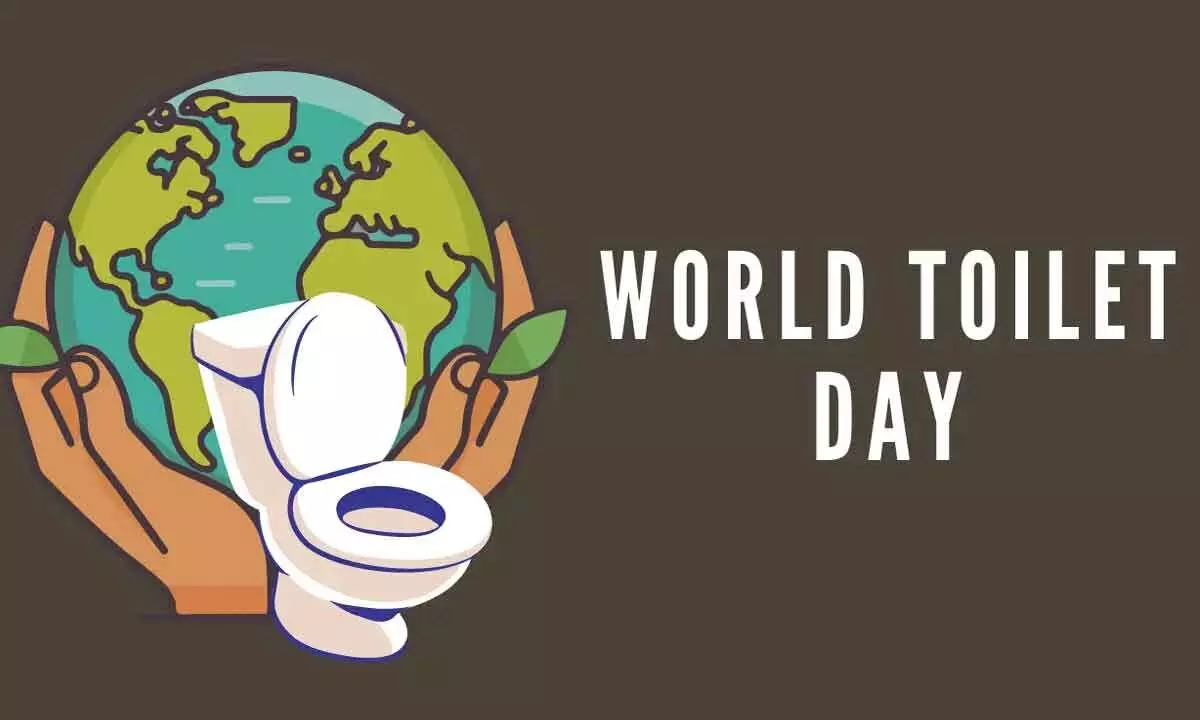Live
- Former SC judge V. Ramasubramanian appointed as NHRC Chairperson
- Shyam Benegal: A true inspiration for aspiring film-makers
- Heavy snow forecast in Japan through Tuesday
- Legendary film-maker Shyam Benegal is no more
- Hackers steal over $12.7 billion in over 1,000 crypto heists to date
- BGT: 'Rohit is short of confidence with self-doubts', opines Manjrekar
- Gold gains 30 pc in 2024, silver 35 pc up on COMEX this year: MOFSL
- Delhi HC dismisses anticipatory bail plea of ex-IAS trainee officer Puja Khedkar
- Untouched Goa Beaches You Must Visit in January
- Muzigal launches its State-of-the-art Music Academy in Nallagandla, Hyderabad
Just In
World Toilet Day 2024: Theme, History, and The Importance of Sanitation


World Toilet Day 2024 emphasizes sanitation's vital role in public health and dignity, addressing global challenges linked to inadequate facilities
World Toilet Day shines a light on the global sanitation crisis, urging collective action to ensure access to safe toilets worldwide. This observance aligns with the United Nations' Sustainable Development Goals (SDGs), targeting universal access to sanitation by 2030. Shockingly, over 3.5 billion people still lack adequate sanitation facilities, and countless children face preventable deaths due to unsafe water and poor hygiene.
By highlighting these issues, the day encourages solutions to improve living conditions and protect public health globally.
Theme for 2024: ‘Toilets – A Place for Peace’
The 2024 theme, ‘Toilets – A Place for Peace,’ addresses the increasing risks to sanitation posed by conflicts, climate change, disasters, and neglect. Damaged or destroyed sanitation systems allow waste to spread, causing life-threatening diseases. This year’s theme underscores the critical role of safe toilets in maintaining health and protecting communities, particularly during crises.
The History of World Toilet Day
World Toilet Day was established in 2001 by the World Toilet Organization (WTO), founded by Jack Sim. In 2013, the United Nations formally recognized the day, driven by Singapore's collaboration with the WTO to draft the “Sanitation for All” resolution.
The resolution called on nations to implement policies that provide access to safe toilets for underprivileged communities and eliminate open defecation, a practice detrimental to public health and safety.
Why World Toilet Day Matters
Sanitation is a basic human right, essential for health, dignity, and safety. Inadequate sanitation systems can result in waste contamination, spreading diseases that disproportionately affect vulnerable groups like women and children.
Improving sanitation systems ensures:
• Better health outcomes by preventing disease transmission.
• Greater privacy and safety, particularly for women and girls.
• Enhanced focus on education, work, and daily life without health concerns.
• Accelerating global sanitation efforts is critical for advancing human rights and sustainable development.
How Sanitation Promotes Public Health
Proper hygiene practices and access to safe toilets play a pivotal role in preventing disease and promoting well-being. Clean water and sanitation reduce the risk of waterborne illnesses and foster healthier communities.
Individual efforts to maintain hygiene can also have a ripple effect, contributing to economic growth and social development by lowering healthcare burdens.
India’s Role and Global Campaigns
India has made significant strides toward maintaining its Open Defecation Free (ODF) status. On World Toilet Day, grassroots initiatives, such as surveys and registration drives, are conducted to bridge gaps in sanitation infrastructure. These efforts ensure timely construction of Individual Household Latrines (IHHLs) for eligible families.
This year, India launches the ‘Hamara Shauchalay: Hamara Samman’ campaign, running from November 19 to December 10. The initiative highlights the link between sanitation and human rights, focusing on dignity and privacy, particularly for women and girls.
Globally, World Toilet Day serves as a platform to unite governments, organizations, and individuals in prioritizing sanitation as a fundamental right.
By raising awareness and taking action, we can ensure that every individual has access to safe and dignified sanitation facilities, fostering a healthier and more equitable world.

© 2024 Hyderabad Media House Limited/The Hans India. All rights reserved. Powered by hocalwire.com






